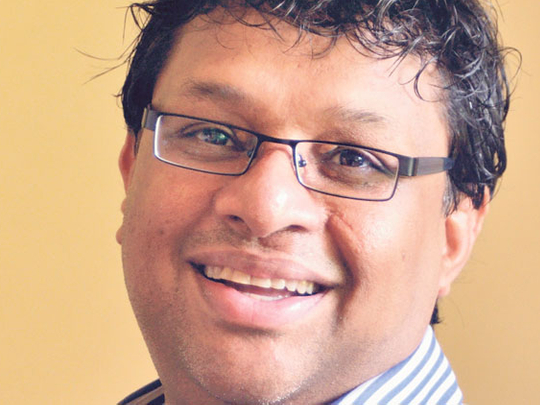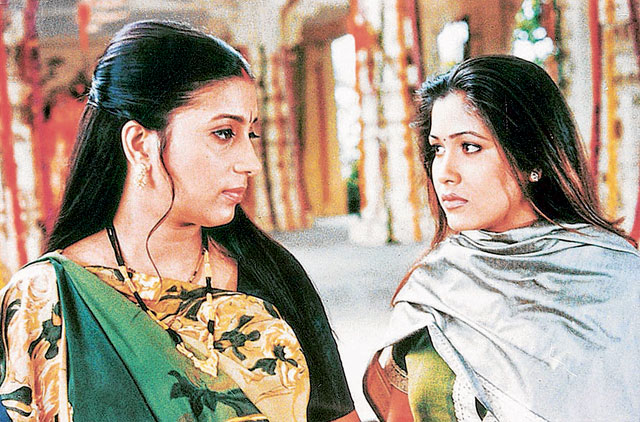
Dubai: Non-resident Indians and Pakistanis make up more than 50 per cent of the UAE's population — the single largest ethnic group in the UAE, according to available statistics.
And according to rough estimates, South Asians — expatriates from India, Pakistan, Bangladesh, Sri Lanka and Nepal — represent 67 per cent of the UAE population.
A Merrill Lynch wealth report estimates 33,000 Indian expatriates in the UAE are millionaires — more than 50 per cent of the millionaires living in the UAE. White-collar professionals account for more than 65 per cent of the Indian community.
Resourceful
Yet this hugely resourceful community is not represented proportionately in the Gulf's electronic media.
Most regional television channels based in the GCC have by and large ignored them.
"There are over nine million South Asians in the Middle East for whom TV entertainment and news is one of the ways of keeping connected with their home country," said Sumantra Dutta, country head of Star Middle East.
Star TV has a bouquet of 13 channels mostly targeting the South Asian viewer and competing with Zee TV and Sony Entertainment .
"In the UAE alone, over 50 per cent of the 7.5 plus million population comprises South Asians and hence the relevance and demand for the Star product is extremely high as these are the same channels that are the choice for viewers back home, said Dutta.
Dutta elaborates on the future game plan for his network in the region.
Gulf News: Could you describe how Star TV is positioned in the Middle East in terms of your viewer reach?
Sumantra Dutta: Star is the world's leading South Asian TV Network and widely known to be the pacesetter in the TV entertainment arena. Our positioning is in line with the brand equity Star has built over the last decade.
In the UAE, Star was the first channel to launch a UAE-wide inter-school contest, Emax Star Quiz challenge, reaching out to International and Indian schools across UAE.
In the UAE, we were the first channel to launch a short format concept, Deal of the Day, during the DSF and subsequently in DSS.
If you self-rank the electronic media in the Middle East, where does Star TV stand?
In a sophisticated people meter rated environment (as in TAM India), Star Plus consistently has led in the Hindi general entertainment (category) since July 2000. Given the range of genres that the channel offers, the content is leagues ahead of any competition.
We are always the most preferred TV offering for the South Asian community in the Middle East. Star Plus is also the highest viewed channel in Pakistan by far.
We recently launched the first Bengali general entertainment channel, Star Jalsha, which is a hit with viewers.
What is Star TV doing to expand reach in the region?
In expanding our reach, we are now also available across platforms in the East, the West, South Africa and the Indian Ocean islands. Given the acceptance of our channels, we are continuing to push for growth.
Despite having a presence in this market for such a long time, Star TV did not launch any channels dedicated for the Middle East. Are you too India focused?
Star has been synonymous with TV since the early days in the Middle East. Star pioneered the launch of cable and satellite TV in the region. In the mid-90s, the Star Select pack was one of the only bouquets for quality English channels available.
The fact that we have been frontrunners in the Indian media landscape sometimes creates the perception that we are India focused only. Star Plus and Star One have dedicated Middle East feeds which allow us to customise content to suit local times and include local content.
Last July, Star undertook the Power of South Asians campaign wherein spec-ific data points were researched.
There is a large number of South Asian expatriates living, working and leading organisations in this part of the world.
What do you have in Star TV that reflects their successes?
Some of the most successful businesses are South Asian owned and their contribution to the region's growth is paramount. However, from a media perspective not much has been done to highlight the achievements and contributions of the South Asians.
Made in the Middle East, Star's upcoming new programming, will be a move to highlight the stories of the South Asian achievers in the Middle East. There are over nine million South Asians in the Middle East for whom TV is one of the only ways of keeping them connected with their home country.
What sorts of media budgets are being dedicated by the corporates here targeting South Asian consumers?
There is a healthy ad spend and estimates indicate about half is allocated to TV. However, since South Asian media is tracked only in the UAE, the allocation these channels get is disproportionately lower compared to the reach they provide.
In terms of consumers, South Asians comprise the single largest share of the population, but ad budgets to target them are much lower.
I believe you are launching some programmes and campaigns around the UAE and the region targeting the South Asian community as well as reflecting the success of the UAE as it prepares to celebrate 40th Independence Day in December?
We have identified a much larger need gap — as broadcasters based out of the UAE, how can we give back something to the people of UAE and create a sense of pride amongst the UAE population. In the media business, we are only as good as our ideas and that is the competitive advantage.
I'm unable to divulge any more information, but it would suffice to say that the idea we are thinking of is big by any standards and has the potential to raise awareness levels about UAE amongst it own people and potential tourists. And it will position UAE as the jewel of the Middle East.
How much are you investing in your campaigns?
Working off the ethos that those who dream the most, do the most, we dare to dream. Star has consistently made moves that are game changing despite our size.
The Power of South Asians campaign required us to spend substantially in order to disseminate the information. One or two bursts are never going to be enough to do justice to that.
We will continue to invest substantially on that initiative to drive home the message further and the fact that Star's channels are the preferred choices for South Asians.
Dubai Star TV has plans in place for Arabic channel
Dubai Star TV, part of Rupert Murdoch's $57 billion (Dh209 billion) News Corporation, is planning to launch a TV channel for the Arab world, Gulf News can reveal.
"There are already a large number of television channels that exist in the region, but there is still room for quality content," said Sumantra Dutta of Star TV. "...We are evaluating the launch of an Arabic channel also.
"From the initial days, we have been very focused on the distribution side of our business. Its only in the last few years that we have focused on developing the advertising sales side given the huge presence of South Asians, our distribution and our leadership in that category."
Star TV, launched in 1991, serves 400 million Indians — that's one in three Indians — through 33 channels in seven languages including 13 that are Star-branded.
The network has been available in the Middle East for the last 16 years with content in English, Hindi and Bengali covering the genres of music, movies, news and general entertainment.
"Star Plus and Star One have dedicated Middle East feeds which allow us to customise content suiting local times and include local content," he said. "However, if the question is about Star offering Arabic language TV content, we are yet to venture into that area."
This will help the network to penetrate deeper into the growing Arab entertainment market. Its Indian rival, Zee TV, has already made inroads into the Arab market with the Zee Aflam channel recently reporting a 22 per cent increase in viewership.
Hindi movies have a strong fan following among the Arabs.








